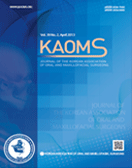Journal of the Korean Association of Oral and Maxillofacial Surgeons
- P-ISSN2234-7550
- E-ISSN2234-5930
- SCOPUS, KCI, ESCI
 ISSN : 2234-7550
ISSN : 2234-7550
Antivascular Therapy via Inhibition of Receptor Tyrosine Kinases in an Orthotopic Murine Model of Salivary Adenoid Cystic Carcinoma
Abstract
Purpose: We evaluated the therapeutic effect of AEE788, a dual inhibitor of epidermal growth factor (EGF) and vascular endothelial growth factor (VEGF) receptor tyrosine kinases on human salivary adenoid cystic carcinoma (ACC) cells growing in nude mice. Experimental Design: We examined the effects of AEE788 on salivary ACC cell growth and apoptosis. To determine the in vivo effects of AEE788, nude mice with orthotopic parotid tumors were randomized to receive oral AEE788 (50 mg/kg) three times per week, injected paclitaxel (200 μg) once per week, AEE788 plus paclitaxel, or placebo. Mechanisms of in vivo AEE788 activity were determined by immunohistochemical analysis. Results: Treatment of salivary ACC cells with AEE788 led to growth inhibition and induction of apoptosis. AEE788 inhibited tumor growth and prevented lung metastasis in nude mice. Furthermore, AEE788 potentiated growth inhibition and apoptosis of ACC tumor cells mediated by paclitaxel. Tumors of mice treated with AEE788 and AEE788 plus paclitaxel exhibited down-regulation of activated EGFR and its downstream mediators (Akt and MAPK), increased tumor and endothelial cell apoptosis, and decreased microvessel density, which correlated with a decrease in the level of MMP-9, MMP-2 and bFGF expression and a decrease in the incidence of vascular metastasis. Conclusions: These data show that tumor-associated endothelial cells are important in the process of tumor-metastasis. And VEGFR can be a molecular target for therapy of metastatic lung lesion of salivary ACC.
- keywords
- AEE788, Adenoid cystic carcinoma, Vascular metastasis, Molecular target
- Downloaded
- Viewed
- 0KCI Citations
- 0WOS Citations